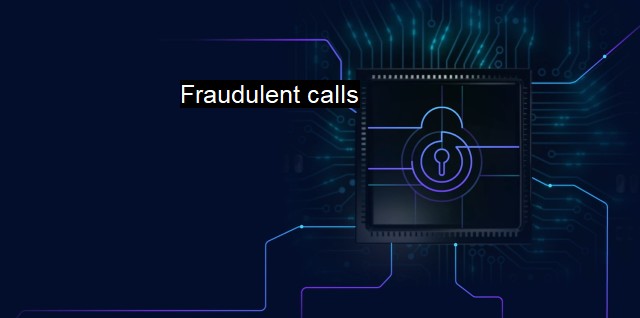What are Fraudulent calls?
Protecting Yourself and Your Sensitive Information: The Dangers of Fraudulent Calls in the Digital Age
Fraudulent calls stand as a significant threat. Also known as vishing, short for voice phishing, fraudulent calls involve attackers making deceptively convincing calls to unsuspecting victims, attempting to persuade or trick them into revealing sensitive personal information such as passwords, bank details, or credit card numbers. Despite the increased cybersecurity systems in place to tackle Internet-based threats, guidelines, and training against fraudulent calls haven't received the same emphasis. This discrepancy results in the necessity to better understand these scams and strengthen measures against them significantly.In fraudulent calls, attackers use technology that allows them to disguise their voice and appear genuine. They may claim to be representatives from familiar organizations – banks, insurance companies, tech support, or even government agencies. Such scams usually involve scare tactics, urgency, or exploiting fears to seek the target's immediate action. they may mention a suspicious transaction on your bank account that requires your immediate attention. They might also pose as tech support, stating that your computer is affected by a severe virus and requires immediate remedy for which they need your account details or access to your computer.
Preventing these types of fraud can be particularly challenging due to their unique nature. Unlike more ordinary forms of digital attacks – hacking, viruses, etc., which we can protect against using firewalls and antivirus software – fraudulent calls involve human interaction, making it conducive to social engineering. Attackers mostly target vulnerable people inadequate in dealing with unknown callers and technology, such as the elderly or those not conversant with tech-related issues.
Various strategies can be employed to detect and protect oneself from fraudulent calls. Knowing the distinctive characteristics such calls exhibit is necessary. For instance, anonymous or hidden numbers and pressure tactics can be a red flag. Further, genuine organizations rarely ask for sensitive information over the phone. When in doubt, it is advisable to disconnect the call and independently contact the organization the caller supposedly belongs to and confirm.
Several steps can be undertaken to minimize the risk of being a victim of fraudulent calls. Ensuring to keep personal information confidential is a crucial step. Thus, such data shouldn't be shared on social media or websites unless absolutely necessary. Call-blocking options are also available to stop unknown numbers from contacting you. Various smartphone manufacturers build these capabilities natively on their devices, and standalone applications can also be used for the purpose.
Understanding filters, privacy settings, and the basics of cybersecurity can enhance one's defense yet so much more. Spam and scam detection applications can be installed on phones, and governments across different nations are establishing procedures and systems to decrease the probability of these calls.
Even with the right tools, techniques, and good cybersecurity measures, the best bet against fraudulent calls is awareness and vigilance. Always being attentive to the calls received, questioning unanticipated requests for personal information, and regularly keeping abreast with newer forms of fraudulent tactics are pivotal.
While fraudulent calls pose a significant threat in the contemporary connected world, one shouldn't feel completely defenseless. With continual strides in cybersecurity measures, imperative steps at individual levels can effectively mitigate the risk posed by such scams. Remembering that the attackers' goal is to exploit the vincible human factor can help approach these threats with a combination of skepticism, awareness, technical tools, appropriate cyber hygiene, and constant vigilance – a fortified shield against the ever-evolving architecture of voice phishing attacks, i.e., fraudulent calls.

Fraudulent calls FAQs
What are fraudulent calls in the context of cybersecurity and antivirus?
Fraudulent calls are phone calls that attempt to trick the recipient into providing sensitive information, such as login credentials or financial data, with the goal of stealing money or committing identity theft.What are some common types of fraudulent calls?
Some common types of fraudulent calls include phishing calls, tech support scams, and robocalls. Phishing calls try to fool the recipient into believing that they are speaking with a legitimate company or organization in order to obtain sensitive information. Tech support scams often claim to be from reputable companies offering help with computer issues, but instead, they try to gain remote access to the user's computer and install malware. Robocalls are automated calls that often try to sell bogus products or services.How can I protect myself from fraudulent calls?
To protect yourself from fraudulent calls, you should never provide personal or sensitive information to unsolicited callers. You can also use call blocking or screening features on your phone, and avoid answering calls from unfamiliar numbers. Additionally, you can install antivirus or antimalware software on your device, which can help detect and block malicious calls or texts.What should I do if I receive a fraudulent call?
If you receive a fraudulent call, you should hang up immediately and report the call to the relevant authorities or consumer protection agency. You can also block the number on your phone, and if you believe that you may have unwittingly given out sensitive information, you should change your passwords and monitor your accounts for suspicious activity.| | A | | | B | | | C | | | D | | | E | | | F | | | G | | | H | | | I | | | J | | | K | | | L | | | M | |
| | N | | | O | | | P | | | Q | | | R | | | S | | | T | | | U | | | V | | | W | | | X | | | Y | | | Z | |
| | 1 | | | 2 | | | 3 | | | 4 | | | 7 | | | 8 | | |||||||